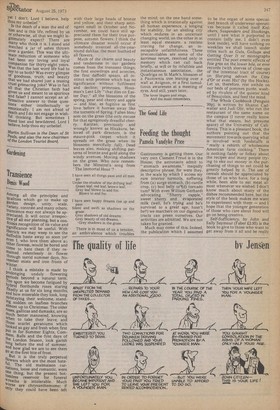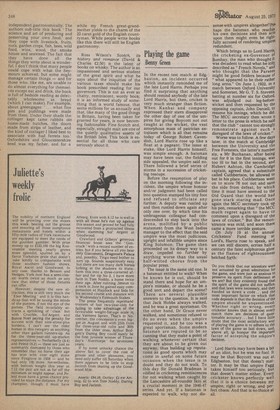'The Good Life
Feeding the thought
Pamela Vandyke Price
Gastronomy is getting there. Our very own Clement Freud is in the House; the astronauts admit to "stomach awareness," insipidly descriptive phrase, for were they, in the scale by which I access my rare interior turmoils, suffering from (a) surge stomach, (b) curdle crop, (c) boil belly ori(d) tornado tom? With even William Gerhardi advocating " Sherry vapple," sweet sherry and evaporated milk (well, he's trying and he's survived to a great age, hasn't , he?) we marchers on our digestive tracts can preen ourselves, Our , activities are admitted. We are not taken for granted. Much may come of this. Indeed, the publication which I assumed
to be the organ of some specialised branch of underwear operatives because it called itself Knickers, Suspenders and Stockings, until I saw what it purported to contain (silly me, I didn't even look inside), will have nothing on weeklies we shall launch under titles such as Guts, Gollups and Getting Over It or monographs entitled The poet emetic effects of foie gras on the lower bile, or ever records (with sleeves of close-ups of the intestinal tract of course) on Slurping adown the C6te d'Or or even Hid (by the Hocks). Let us, therefore, rest awhile on our beds of pommes puree, washed by rivulets of the quieter kind of Beaujolais, and feed the mind.
The Whole Cookbook (Penguin 30p), is written by Sharon Cadwailer and Judi Ohr, who run the restaurant of the same name on the campus (1 never really know what that means, but presume space) of the University of California. This is a pleasant book, the authors pointing out that the movement towards querying what is involved with foodstuffs is " really a rebirth of wholesome American farm cooking." There is nothing faddy or folksy about the recipes and many people trying to eke out money in the purchasing of things to eat could be greatly helped by it. The use of cereals should be appreciated by those of us who have, for a long while, been able to eat meat almost whenever we wished. I don't know much about many of the dishes recommended here, but the style of the book makes me want to experiment with them — and I hope that the younger generation of those who care about food will go on being creative.
Self-Sufficiency, by John and Sally Seymour (Faber £2.95) is the, book to give to those who want to get away from it all and be really
independent gastronomically. The authors sub-title this book The science and art of producing and preserving your own food,' and they cope with livestock, fruits, nuts, garden crops, fish, bees, wild food, wine, wood, the smoke house and seaweed. The fact that they have done all the things they write about is wonderful. I don't think that many people could cope with what the Seymours achieved, but some might manage certain things — and for those who, like me, are unable to do almost everything for themselves except eat and drink, the book is full of bedside reading as delectably wholesome as bread (which I can make). For example, about greengages: ' ... what fine pies and puddings were made from them. Under their shade the. cottager kept tame rabbits oin home-made hutches, the doors made from strips of leather, and the kind of cottager I liked best to associate with had ferrets too.' Oxfordshire and Gloucestershire bred was my father, and for a while my French great-grandmother yields to the charm of the 22 carat gold of the English countryman. While people write books like this there will still be English gastronomy.
Ross Wilson's Scotch, its history and romance (David & Charles E2.50) is the latest of books on whisky. The author is an impassioned and serious student of the great spirit and what he says about the iniquities of the various taxes should make his book prescribed reading for our governors. This is not an ever so chatty, reminiscent, wordy book; it is an informed study of something that is world famous, that earns millions for us annually and that, like many of the good things in Britain, having been taken for granted for years, is now becoming fashionable. Fine Scotch and, especially, straight malt are one of the quietly qualitative assets of the British Isles. This book is essential for all those who care seriously about it.



































 Previous page
Previous page